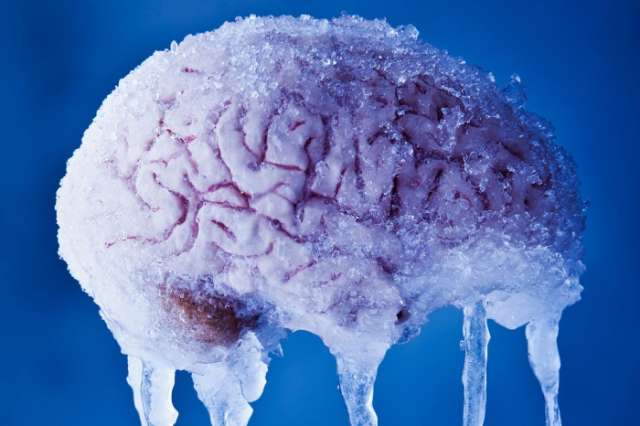And while it's hardly the hours-long skull throbber a migraine or sinus headache can be, brain freeze is officially categorized as a type of headache as well, and it's listed in the International Classifications of Headache Disorders. To understand what triggers the sensation and find out how to ease the pain fast—or prevent it from ruining your ice cream indulgence in the first place—we reached out to doctors and researchers for the science behind it.
What exactly is brain freeze?
No, your brain doesn't actually become frozen. Brain freeze happens when a cold substance, like ice cream, is introduced behind the nose and palate, Dr. Lauren Natbony, a neurologist at the Mount Sinai Hospital in New York City, tells Health. When the bundle of nerves in this part of the mouth sense something cold, they send an instant message to the brain, causing arteries and blood vessels to react. As a result, your head starts to throb.
"The pain comes on soon after something cold has touched the palate and is typically ‘referred’ to the forehead," says Dr. Anne MacGregor, a headache specialist at the Barts and The London School of Medicine and Dentistry in the UK. The ache comes on fast, just as the cold temperature of your ice cream or drink hits those nerves. "It lasts just few seconds but sometimes minutes," before fading away, says MacGregor.
By itself, brain freeze is harmless, and the phenomenon isn't associated with any worrisome neurological conditions. However, it is linked to migraines. People who suffer from migraines tend to be more prone to brain freeze, says Natbony, because the same nerves in the palate are responsible for triggering both types of head pain.
How can I get rid of it?
Brain freeze is temporary and not exactly something serious enough to take a sick day for, so it's perfectly okay to just wait it out. But if it's super intense, or you just don't want to deal with the buzzkill, there are solutions. MacGregor suggests drinking warm (but not hot) water slowly as you sense brain freeze coming on; the warm water will mitigate the cold sensation in your palate, and your head shouldn't throb as intensely or for quite as long.
Another quick brain freeze fix is to press your tongue or the tip of your finger against the roof of your palate, which will warm up the nerves there similar to the way warm water can. While Natbony says that no science backs up this trick, it can't hurt to give it a try. "If you introduce warmth during the brain freeze, it seems like that should work," she says.
How to prevent brain freeze
Of course, the easiest way to keep brain freeze from striking is to avoid consuming ice-cold food and beverages, says MacGregor. But in the summer, or on a sunny warm vacation, that's not all that realistic—or fun.
So prevent brain freeze from happening in the first place by eating your ice cream very slowly, especially during that initial bite or lick, so the nerves in your palate aren't overwhelmed with the cold sensation. Or try eating cold food toward the front of your mouth, which helps you avoid the sensitive nerve endings toward the back that trigger brain freeze, suggests Natbony.
If none of these solutions help, Natbony also advises that you heat your cold food to a warmer temperature before putting it in your mouth. So if you can handle a soupy, warm pint of rocky road, stick your bowl in the microwave for a couple of seconds before devouring it.
More about: #BrainFreeze
















































